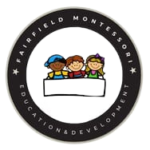Montessori Curriculum
Home > Montessori Curriculum
Montessori Curriculum
The Montessori curriculum presents children with five essential study areas: Practical Life, Sensorial, Mathematics, Language, and Culture. Each domain comprises a collection of Montessori materials, each dedicated to teaching a specific knowledge area or skill. Through consistent repetition and practice, children cultivate a solid understanding of each material and attain proficiency in the fundamental competencies of each curriculum domain.
How Does the Montessori Curriculum Work?
The Montessori Curriculum divides children’s learning into five main areas: Practical Life, Sensorial, Mathematics, Language, and Cultural Studies. Each of these areas comprises a series of educational materials that gradually increase in complexity. Children navigate through the Montessori Curriculum at their own pace, determined by their developmental stage and individual interests.
Montessori instructors introduce key lessons to familiarize children with the names and learning objectives associated with each Montessori material. Following a Key Lesson, children independently engage with the Montessori materials to reinforce learning, explore concepts, and establish connections with the identified learning outcomes.
Throughout this process, Montessori educators step back, observe the children’s learning processes, and document their progress. Intervention from educators only occurs if necessary, aiming to promote children’s independence. The correlation between children’s sense of empowerment and their ability to acquire and retain new skills and information underscores the minimal interference approach.
As children advance to the next stage, new lessons are introduced based on their readiness. Through consistent repetition and practice, children master the progression of Montessori materials, cultivating a foundational understanding of each aspect of the curriculum.
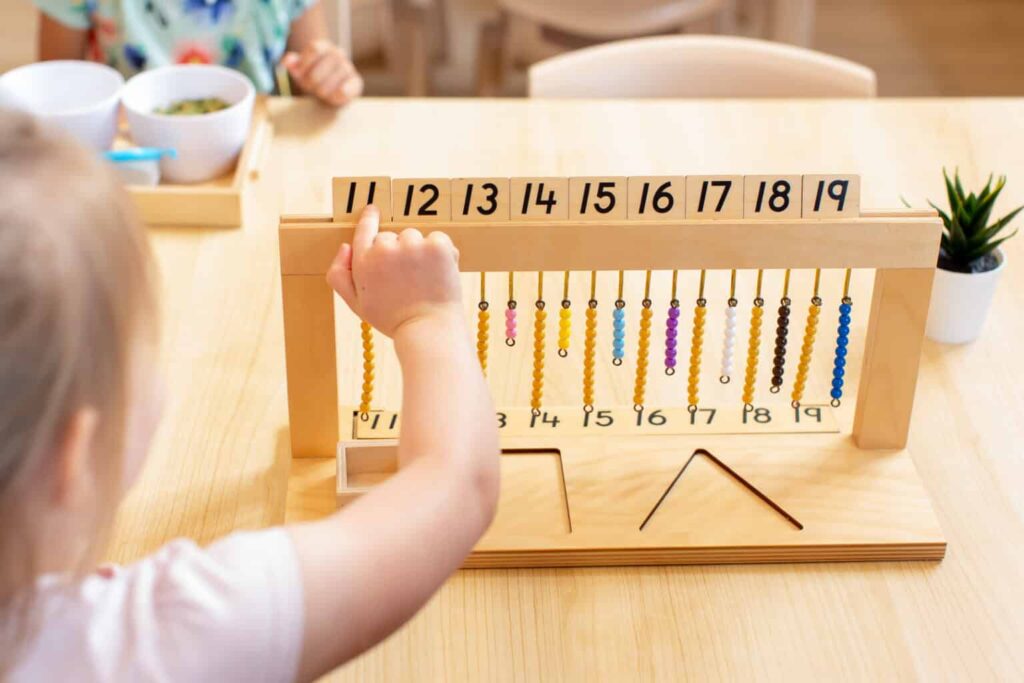
What’s Unique About Montessori Materials?
- Practical life: Independence, social skills and care for the environment
- Sensorial: Colours, shapes, textures, weights, dimension, discrimination and distinguishing between smells, taste and sound
- Mathematics: Numbers, quantities, counting, addition, subtraction, decimal system, multiplication and division
- Language: Oral language, phonics, letter formation, sentence structure, vowels and consonants, writing, reading and early literacy skills
- Culture: Geography, botany, zoology, science, history, music and art
The Five Areas of the Montessori Curriculum
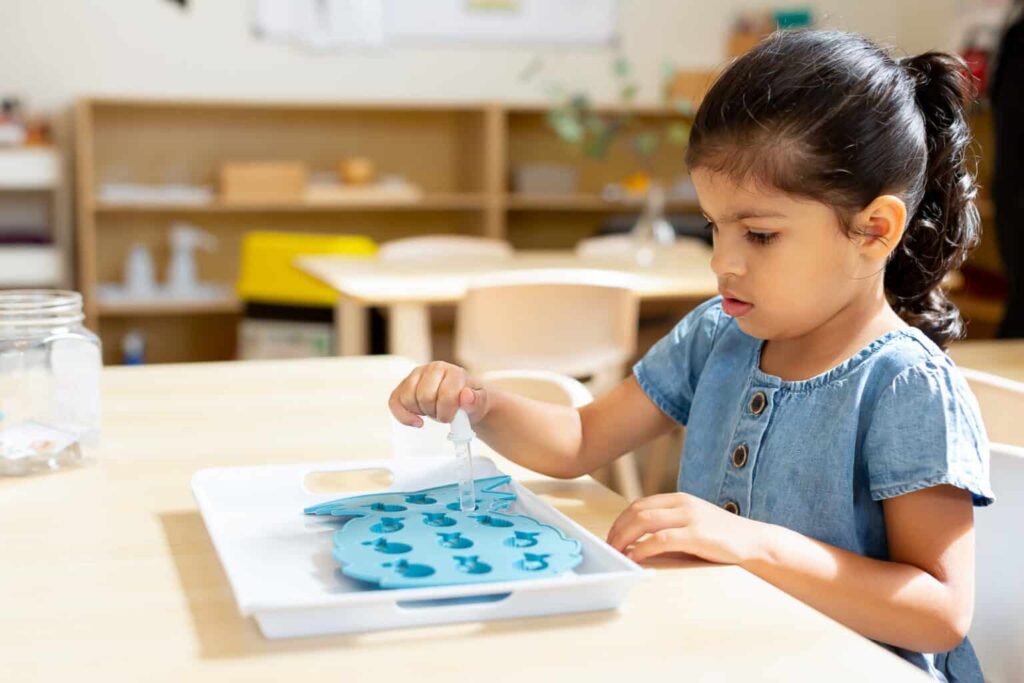
Practical Life
The Montessori Practical Life Curriculum incorporates exercises and activities that children observe in daily life. These activities develop children’s independence, concentration, and fine motor skills. Typical practical life activities involve transferring, food preparation, lessons in grace and courtesy, and cleaning.
Example materials and activities include:
- Spooning
- Tonging
- Threading
- Sweeping
Sensorial
Sensorial activities teach children to refine their senses of sight, touch, sound, smell and taste so that they are able to organise sensory impressions and their understanding of the world. Through sensorial materials, children learn about similarity and difference, dimensions, colours and shapes, and distinguish between smells, taste and sound. Sensorial work also prepares children for mathematics, language and geometry by teaching children how to classify and sort.
Example materials and activities include:
- Pink Tower
- Colour Box
- Geometric Solids
- Trinomial Cube
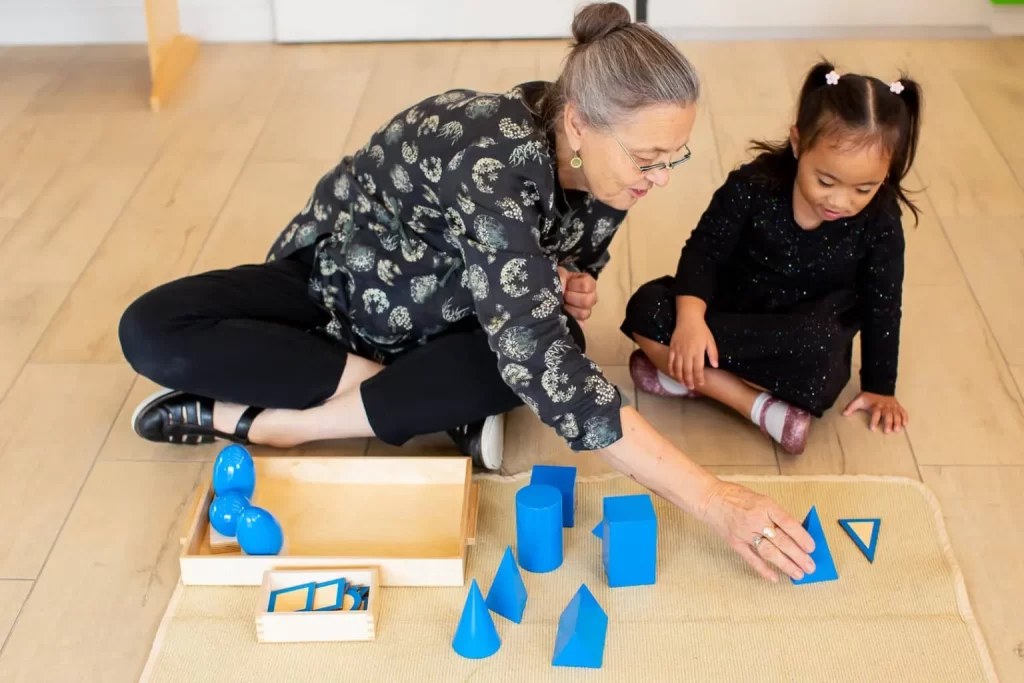
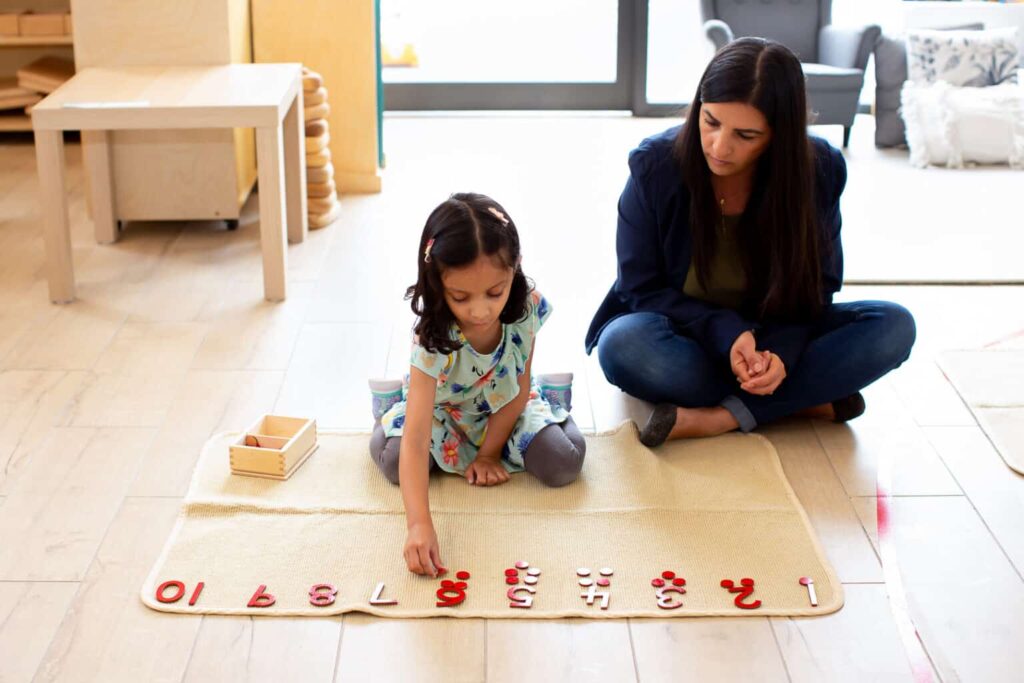
Mathematics
The Mathematics Curriculum teaches children to understand abstract mathematical concepts and relationships through hands-on learning experiences. Children learn to count, identify and match numerals to their quantity, relate decimal quantities and symbols, and become aware of the functions of addition, subtraction, multiplication and division by using the Montessori materials.
Example materials and activities include:
- Numerals and Counters
- Hanging Bead Stair
- Teen Boards
- Hundred Board
Language
The Montessori Language Curriculum provides children with the knowledge and skills to build their vocabulary and understanding of language. The skills required for reading, writing and oral language are developed through hands-on experience using the Montessori language materials. Children learn letter sounds (phonics), letter identification and formation, how to combine sounds to make words, how to build simple sentences, and how to properly hold a pencil. Oral language skills are developed through daily social interactions, group time experiences, and lessons in grace and courtesy.
Example materials and activities include:
- Sandpaper Letters
- Moveable Alphabet
- Metal Insets
- Three Part Cards
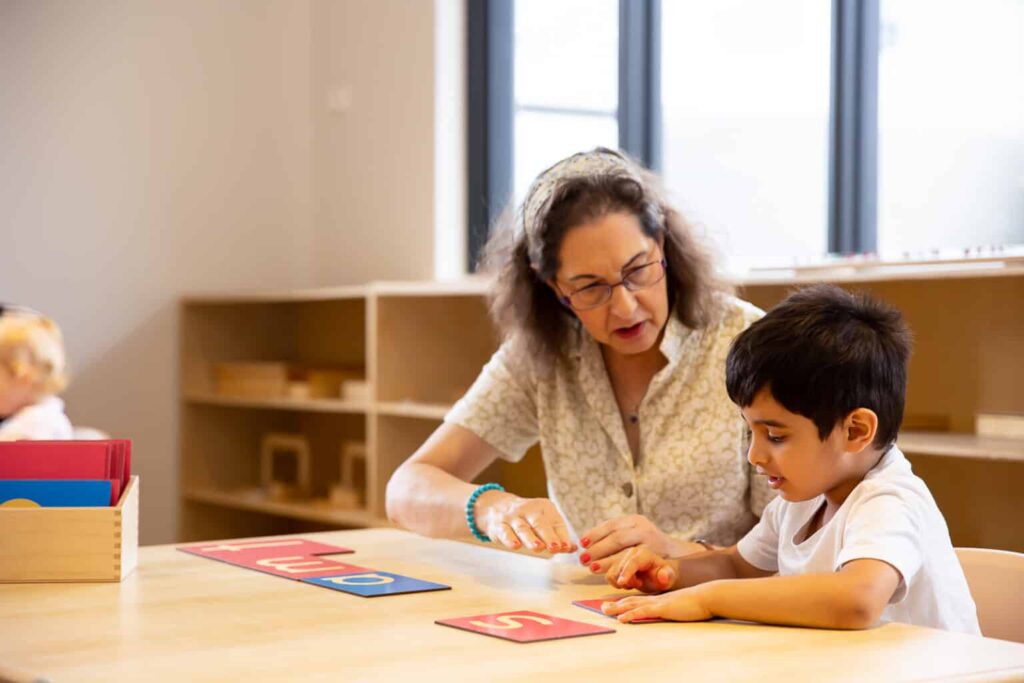
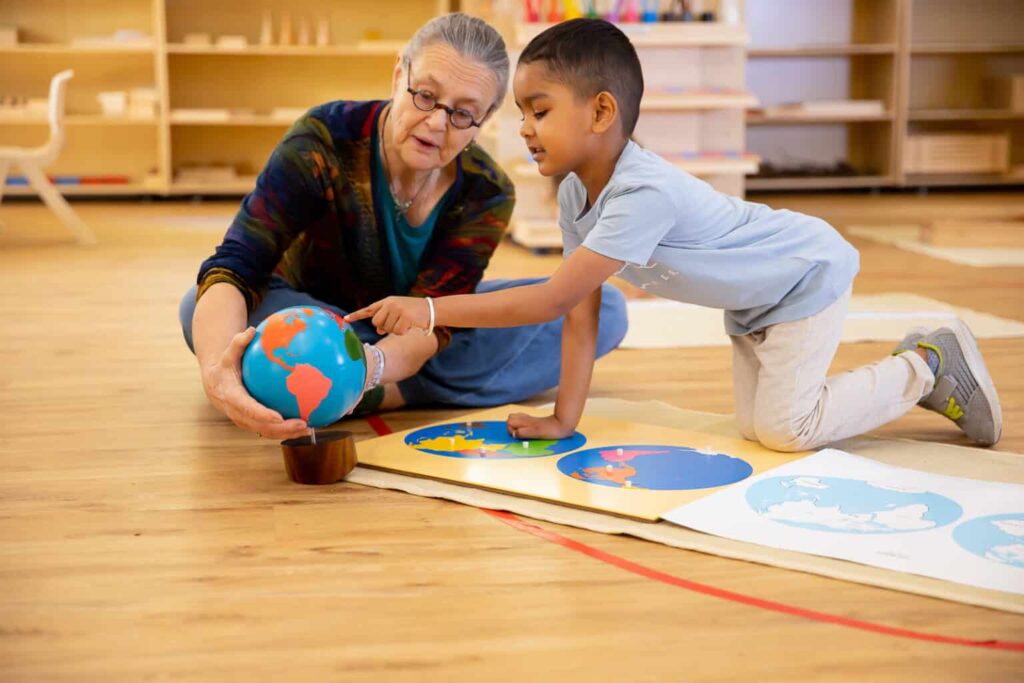
Culture
The Culture Curriculum incorporates a wide range of subjects, including: Geography, Botany, Zoology, Science, History, Music and Art. Through explorations of culture, children develop an understanding of their community, their world, and their social responsibilities. Children learn to respond to diversity with respect, appreciate music and art, and develop awareness of sustainability.
Example materials and activities include:
- Land and Water Forms
- Continent Boxes
- Life Cycle Puzzle and Activities
- Map Cabinet
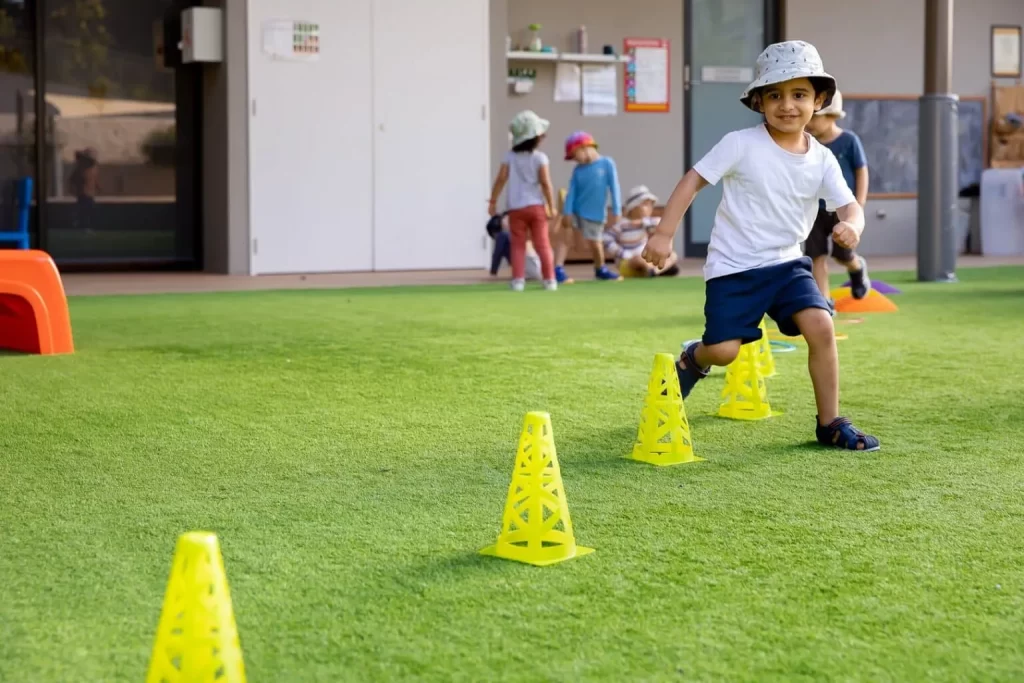
Where to next? Montessori & EYLF
Montessori Academy delivers a blended curriculum that incorporates both Montessori Education and the Early Years Learning Framework (EYLF). These programs work together to enhance children’s learning and development during their crucial formative years.
